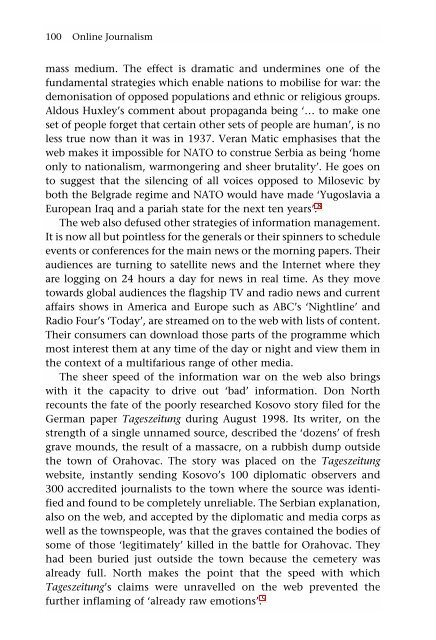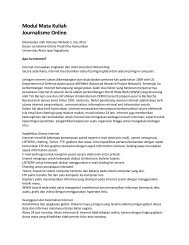Online Journalism - Ayo Menulis FISIP UAJY
Online Journalism - Ayo Menulis FISIP UAJY
Online Journalism - Ayo Menulis FISIP UAJY
You also want an ePaper? Increase the reach of your titles
YUMPU automatically turns print PDFs into web optimized ePapers that Google loves.
100 <strong>Online</strong> <strong>Journalism</strong><br />
mass medium. The effect is dramatic and undermines one of the<br />
fundamental strategies which enable nations to mobilise for war: the<br />
demonisation of opposed populations and ethnic or religious groups.<br />
Aldous Huxley’s comment about propaganda being ‘… to make one<br />
set of people forget that certain other sets of people are human’, is no<br />
less true now than it was in 1937. Veran Matic emphasises that the<br />
web makes it impossible for NATO to construe Serbia as being ‘home<br />
only to nationalism, warmongering and sheer brutality’. He goes on<br />
to suggest that the silencing of all voices opposed to Milosevic by<br />
both the Belgrade regime and NATO would have made ‘Yugoslavia a<br />
European Iraq and a pariah state for the next ten years’. 8<br />
The web also defused other strategies of information management.<br />
It is now all but pointless for the generals or their spinners to schedule<br />
events or conferences for the main news or the morning papers. Their<br />
audiences are turning to satellite news and the Internet where they<br />
are logging on 24 hours a day for news in real time. As they move<br />
towards global audiences the flagship TV and radio news and current<br />
affairs shows in America and Europe such as ABC’s ‘Nightline’ and<br />
Radio Four’s ‘Today’, are streamed on to the web with lists of content.<br />
Their consumers can download those parts of the programme which<br />
most interest them at any time of the day or night and view them in<br />
the context of a multifarious range of other media.<br />
The sheer speed of the information war on the web also brings<br />
with it the capacity to drive out ‘bad’ information. Don North<br />
recounts the fate of the poorly researched Kosovo story filed for the<br />
German paper Tageszeitung during August 1998. Its writer, on the<br />
strength of a single unnamed source, described the ‘dozens’ of fresh<br />
grave mounds, the result of a massacre, on a rubbish dump outside<br />
the town of Orahovac. The story was placed on the Tageszeitung<br />
website, instantly sending Kosovo’s 100 diplomatic observers and<br />
300 accredited journalists to the town where the source was identified<br />
and found to be completely unreliable. The Serbian explanation,<br />
also on the web, and accepted by the diplomatic and media corps as<br />
well as the townspeople, was that the graves contained the bodies of<br />
some of those ‘legitimately’ killed in the battle for Orahovac. They<br />
had been buried just outside the town because the cemetery was<br />
already full. North makes the point that the speed with which<br />
Tageszeitung’s claims were unravelled on the web prevented the<br />
further inflaming of ‘already raw emotions’. 9
















